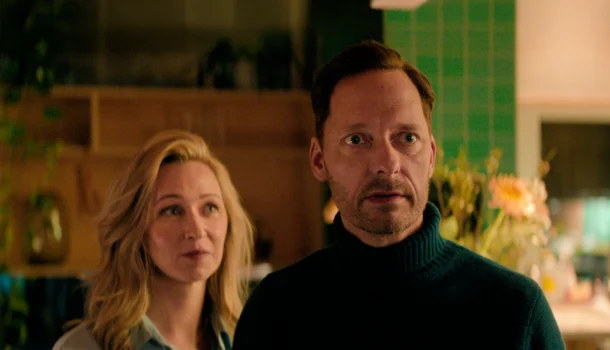Not every journey begins with purpose. Some are born out of exhaustion, collapse, or the absence of alternatives. “The Wrong Track” sets itself precisely in this landscape of impasse, transforming the course of a Norwegian ski marathon into something far more intimate: the topography of a disoriented soul trying — without guarantees — to find a semblance of consistency. Emilie, at the eye of the storm, is not searching for redemption. She simply wants to escape the depths she has reached — just enough, perhaps, to begin glimpsing the horizon.
Her path unfolds like a diary of daily wreckage. Emilie moves through a world where every choice digs her hole deeper. Relationships are fragile, motherhood feels like a burden, and vices operate as crutches that no longer hold her up. Her daughter, Lilli, watches this unraveling at close range, while her ex-husband, now enchanted by the stable image of a ski influencer, threatens to take the one thing left: custody. It’s in this precarious threshold — between losing everything and trying something — that her brother Gjermund lays out a paradox: either she faces the 54 kilometers of the Birken, or she keeps running from herself.
This challenge is far from just physical, and the film is fully aware of it. The ski race, far from serving as an empty metaphor, becomes a visceral extension of an internal war. Each meter skied carries fragments of a fractured existence. The physical strain of the course echoes the fatigue of a life trapped in loops of carelessness. It’s not about winning or failing, but about maintaining the next step. In that sense, the film delicately builds a story about emotional endurance — not as a grand epiphany, but as the raw practice of persistence.
Emilie’s surroundings intensify the underlying tension. Gjermund, portrayed with restrained precision by Trond Fausa, embodies the last anchor before collapse. His wife Silje, meanwhile, bears in silence the pain of infertility — an unspoken contrast to Emilie’s negligent motherhood. Silje’s gaze, hovering between contempt and compassion, adds a powerful ethical undertone, replacing moral judgment with human bewilderment.
The frozen landscape is far from a neutral backdrop; it becomes an emotional projection of Emilie’s inner terrain. The cold, the snow, the piercing whiteness — all reflect her hesitation. The sound design doesn’t just illustrate; it suffocates. The labored breath, the scraping of skis, the sound void that envelops solitude — everything draws the viewer into an immersion that denies detachment. We are made to feel the weight of every missed decision, every delayed gesture.
Yet what sets “The Wrong Track” apart isn’t the journey itself, but its refusal to offer emotional shortcuts. Emilie finds no salvation in scenery or motivational speeches. What the film offers is a woman undone by her circumstances, trying to rebuild not out of heroism, but because she’s too exhausted to keep falling. Ada Eide plays her with austere subtlety, stripped of embellishment. Every movement carries doubt — and it’s this vulnerability that makes her performance so arresting.
By the end, the race ceases to function as a destination. What matters is what happens between stumbles — the hesitation, the doubt, the near surrender. Emilie doesn’t need to cross the finish line for her story to count. What matters is the act of moving forward, even without knowing if it’s worth it. And in that act, the film finds its resonance: not in triumphant victories, but in the fragile impulse to keep going when everything else begs you to quit.
Without fanfare or easy answers, “The Wrong Track” shapes a narrative about the fatigue of living and the silent courage to begin again. Its predictability, far from a flaw, becomes a counterweight to the protagonist’s emotional volatility — a kind of minimum structure she can finally lean on. Sometimes, what one needs isn’t a new path, but the strength to walk the old one — knowing it never truly led anywhere at all.
Film: The Wrong Track
Director: Hallvar Witzø
Year: 2025
Genre: Comedy
Rating: 7/10

